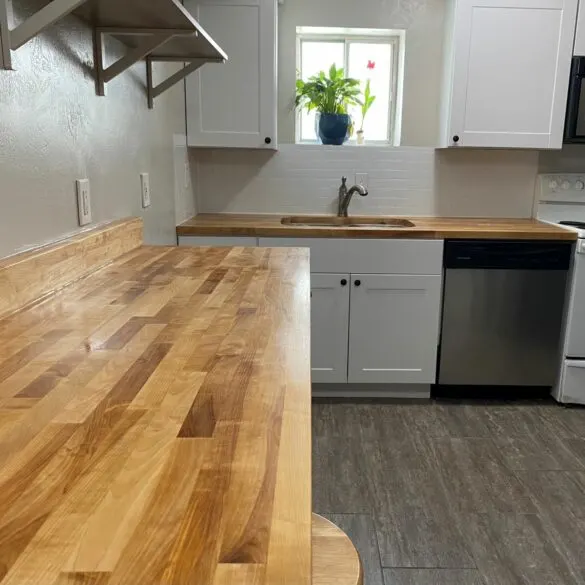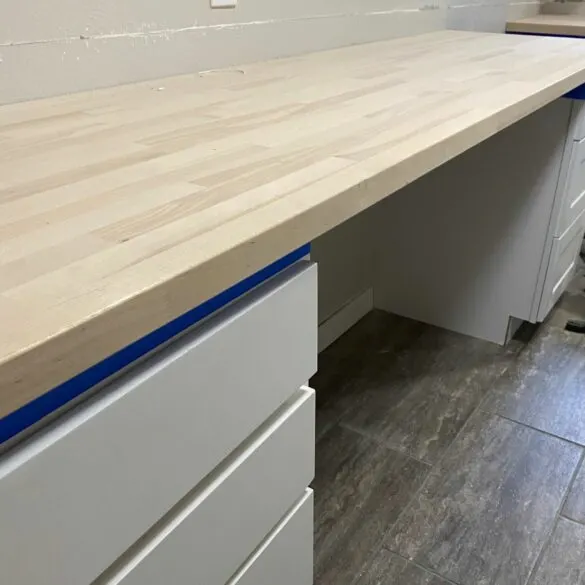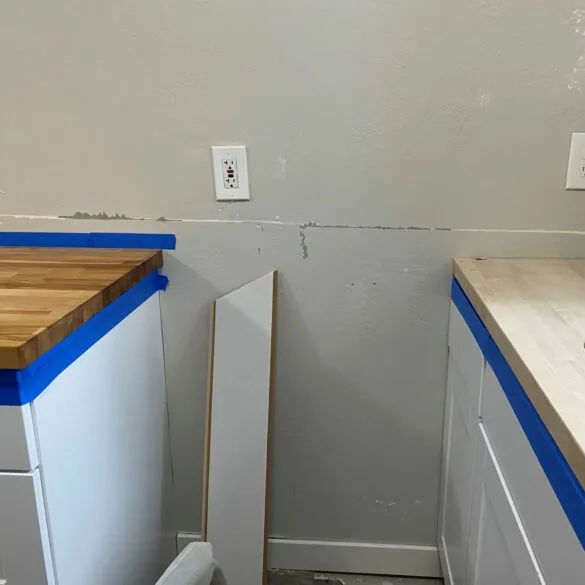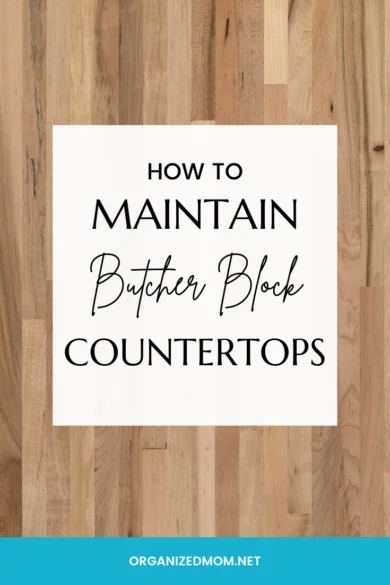I love the earthy warmness of Butcher Block countertops. They have a way of making kitchens look and feel more comfortable and inviting.
But while Butcher Block countertops look amazing, they do require specialized care that you should be aware of before installing them.

How to Care for and Maintain Butcher Block Countertops
Because the wood is porous and softer than marble or stone, it does require some care and maintenance.
If the butcher block dries out it will crack and separate, and if it gets too much moisture it will eventually start to grow mold. You’ll also need to be careful of deep nicks and cuts in the wood, because if they are not cleaned and sanded or buffed out they will start to grow bacteria.
So How Much Work Does it Take?
There are a few different approaches you can take for caring for your Butcher Block Countertops. Some of them are a little more time consuming than others.
There is a range of methods and products you can use to treat your butcher block countertops. But you’ll need to be careful what types of sealers and chemicals you use, because you don’t want the chemicals to leak into your food and contaminate it.
Original Care – Mineral Oil
The original way to maintain Butcher Block Countertops is with mineral oil. The mineral oil acts as a seal to help keep the wood from drying out too much. It also helps protect it from water damage.
Mineral oil is also one of the safest ways to treat your counters without having to worry about it getting into your food.
When your butcher block countertops are brand new, you may have to apply the mineral oil once a day for an entire week. Then apply the mineral oil every two weeks until the counter’s become adjusted to your home.
After that, it’s recommended to apply the mineral oil once every month- until forever.
This might be more maintenance than most busy households will have time for.
How to Apply Mineral Oil to Butcher Block Countertops
The easiest way to apply Mineral Oil to butcher block countertops is to first clean the counters with a slightly damp cloth. This is to remove any dust particles. After the butcher block dries completely, take a clean rag and wipe the mineral oil over the entire surface and edges of the countertop.

To prevent the oil from soaking into the rag some people will wrap the rag in a plastic bag and then apply the oil with the plastic. Both of these methods work well.
It takes a few hours for the oil to soak into the wood, so you won’t be able to use your counters until the mineral oil has dried.
Sealing Butcher Block With Polyurethane
Another less time intensive option to care for your butcher block counters are to seal them with polyurethane.
While the mineral oil helps to protect the butcher block from damages or drying, it doesn’t make it completely waterproof. Which means in areas around the sink your counters will be more prone to mold.
Polyurethane, on the other hand, will actually seal the butcher block making it essentially waterproof. It also only needs to be applied once every year or two, unlike mineral oil that requires monthly maintenance.
What is Polyurethane?
Polyurethane is applied as a liquid which eventually dries into a thin plastic film to waterproof the butcher block.
Because it is a small plastic film, you won’t be able to use your butcher block counters directly as a cutting board anymore.
Two Types of Polyurethane
There are two types of polyurethane: oil based or water based.
The organic solvents in oil-based products soak into the wood grain, so the varnish gets deep into your counters, whereas water-based products tend to remain on the surface.
The oil based products can also slightly alter the color of your counters. You’ll want to test it on a scrap piece of wood to see if you’re happy with the color before applying it.
I personally think that oil based is the best for butcher block countertops, but you’ll want to do your own research and decide for yourself what type of product to use.

How to Apply Polyurethane
Polyurethane is relatively easy to apply. The only negative is that it does have a strong chemical smell until it dries. You’ll definitely want to do this project when you can have windows open and excellent air flow.
The first step to sealing your butcher block countertops with polyurethane is to tape off any cabinets that are underneath your countertops, and cover the floor with painters plastic. Just in case there are spills or drips, you don’t want the polyurethane ruining your cabinets and floors.
The next step is to sand down your butcher block countertops. Sanding them down helps remove any imperfection, removes any mold and gives you a smooth surface to seal.
Next, you’ll need to remove all the debris and dust. The most effective method is actually to vacuum your counters. Then give them a good wipe-down with a damp cloth.
After your counters are dry it’s time to apply the polyurethane. For best application, you’ll need a two to three inch “natural bristle” brush, if you’re using oil based polyurethane. If you choose to go with water based polyurethane then you’ll need a brush with synthetic bristles.
Apply the polyurethane in small areas, working quickly to get the entire counter covered.
Work to find a balance with the pressure used on the brush so that the product is applied smoothly, without streaks or bubbles. Be sure to watch the edge of the counters for any runs or spills.
It takes about four hours for the counters to no longer be tacky to the touch. This is also about how long it takes for the smell to subside. But you’ll want to let the counter’s rest for 36 hours before using them or placing anything on them.
I hope this has helped you decide if installing butcher block countertops is right for you. There is some work involved in how to maintain butcher block countertops but I love mine!
